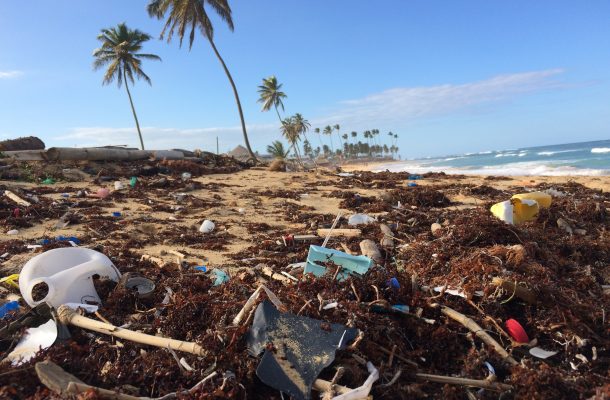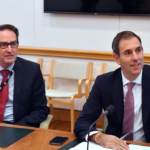Who is your recycling hero?

Plastic pollution is destroying the planet. As governments and media shine a light on the issue, global awareness of plastic pollution is rising, with initiatives such as Global Recycling Day looking to lead change.
In response, industries and companies are looking to adopt greener attitudes, introducing policies and products to reduce the amount of plastic waste they generate. Global Recycling Day invites participants to ‘Read’ about innovation in recycling, to ‘Learn’ about recycling heroes, and to ‘Do’ what you can to recycle more, such as offering a plastic-free solution such as a plumbed-in water dispenser.
#RecyclingHeroes are taking a stand against plastic pollution to help consumers make more environmentally-minded buying decisions.
A study by the University of California highlighted how the plastic packaging industry – through items like bottles and bags – produces 161m tonnes of the material annually, while 40% of all plastic produced is some form of packaging that’s used just before being discarded.
From contaminated waterways to impacted infant health, plastic has become the concern of our generation. Experts now consider plastic as serious a threat to global livelihoods as climate change, illustrating the severity of the problem and the need for immediate change.
Companies including Waterlogic are looking to reverse the tidal wave of plastic. First, by reducing the need for single-use plastic in the workplace, then through the continuous promotion of responsible practices.
The most common source of plastic pollution
Out of 187,000 pieces of plastic found across six-continents from 239 clean-up events, participants most often found plastic from everyday consumer packaged goods. Single-use plastic items people buy, consume, then throw out almost immediately. This generates a massive volume of plastic waste, not least given that in the United States, 1,500 plastic bottles are discarded every second.
The problem intensifies when you consider that less than one-fifth of all plastic is recycled globally, which in Australia, we only manage to recycle 10% of all waste. Why are these figures such a concern?
Recycling is key to protecting the world’s natural resources and there remains little doubt that recycling is the front line of defense for saving the planet: a fact Global Recycling Day is out to emphasise to the world.
Media attention and recycling heroes are forcing change
Activists from across the world, known as Recycling Heroes, are urging governments and organisations to act now to tackle the climate emergency — with raising awareness of the importance of recycling as their key focus. The popular documentary, Blue Planet, has helped turn the tide on plastic pollution.
Since it first aired, consumer goods companies have been compelled to become more green, introducing a wave of initiatives to counter pollution following what’s become known as the “Blue Planet Effect.” It’s a move that businesses have had to make, as 88% of consumers who have seen the program admit they’ve cut the volume of plastics they consume as a result of what they saw.
The Blue Planet Effect has now become part of a wider media drive to push global awareness of plastic pollution. Finally, sustainable attitudes are prevailing. A host of leading brands, retailers, and packaging companies have pledged to work towards 100% reusable, recyclable, or compostable packaging by 2025: a fact that surely makes David Attenborough a Recycling Hero as he has pushed businesses throughout the UK — including Ecover, Marks & Spencer and L’Oréal — to be eco-friendlier.
Urgent action is needed as part of a collective approach to recycling
Here are five other Recycling Heroes leading the charge: these are a mix of people, places and organisations encouraging change for the long-term benefit of our planet.
-
San Francisco
The undisputed Queen of recycling cities: San Francisco has spent a decade implementing policies to reduce the volume of waste sent to landfill. These include improved public waste management alongside advice to citizens over how to discard items. Since 2013, the city has managed to reduce the amount of waste sent to landfill by 80%.
-
Officeworks
Australia’s largest supplier of office and stationery products has launched a grassroots initiative called Restoring Australia. It aims to plant two trees for every tree felled, using the weight of products sold by the company as the basis for calculations. Restoring Australia has partnered with Greening Australia for the work and has already helped restore degraded landscapes, rejuvenate bushland, and improve habitats for wildlife.
-
Coldplay
An unlikely hero shows that inspiration can come from anywhere. British band Coldplay have put plans to tour their latest album on-hold as they’re concerned about the environmental impact of their concerts. The band has pledged to review how they can make their tours more sustainable and have chosen to broadcast tours for free via platforms like YouTube in place of staging live events.
-
Greta Thunberg
Perhaps the most famous recycling hero of her generation: Greta Thunberg is now an icon spearheading change as she pushes countries, governments, and organisations to act more sustainably. Greta’s movement started in August 2018 as school children took a day off to strike outside the Swedish parliament. Her local stance evolved into a worldwide event known as Fridays For Future, with her influence — called ‘The Greta Effect’ — now commanding change on a global scale.
-
AB InBev
The world’s largest brewer wants to ensure 100% of its packaging is either returnable or made from recycled content by 2025. They are working towards the milestone by working with suppliers to increase the recycling content used across their supply chain. AB InBev started with a 46% baseline rate but believes they are on track to meet their ambitions.
If you know of another Recycling Hero who deserves global recognition, you can nominate your #RecyclingHeroes on the Global Recycling Day website.
Sidrah Ahmad is a writer and marketing coordinator at Waterlogic, an international provider of office water dispensers. She has written on a range of environmental and health issues, including improper waste disposal, single use plastics and water pollution.













